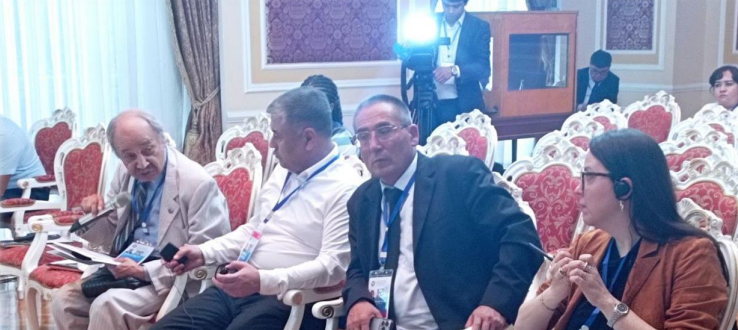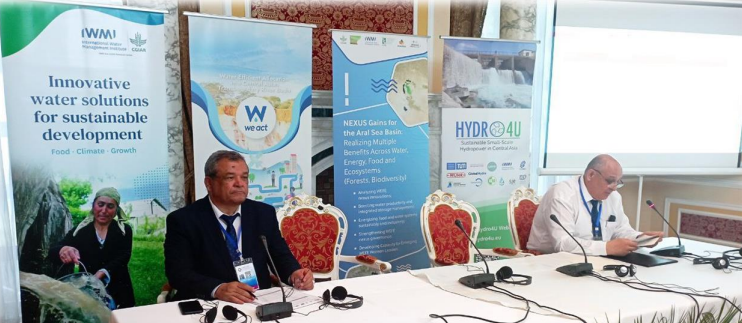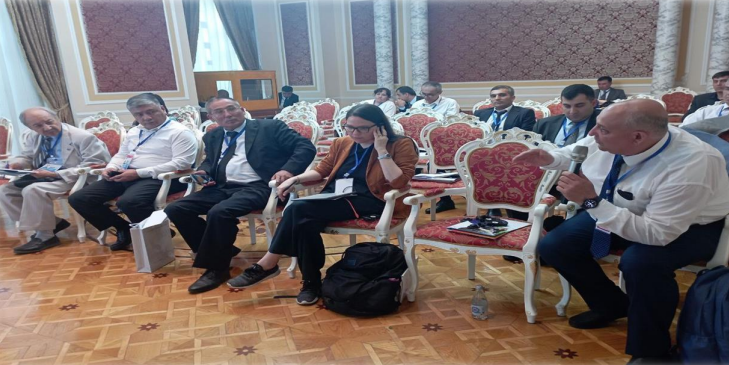Strengthening Cooperation Through the WEFE Nexus in Central Asia
December 4, 2024
On June 12, 2024, Dushanbe, Tajikistan, IWMI organized a pivotal side event titled “Strengthening Benefit Sharing in Central Asia: Role of Water-Energy-Food-Ecosystem (WEFE) Nexus Approach”. This event, held as part of the Third International High-Level Conference on “Water for Sustainable Development” (2018-2028), provided an essential platform for fostering dialogue on integrated resource management in Central Asia, with a particular focus on addressing pressing climate challenges and enhancing transboundary cooperation through the Water-Energy-Food-Ecosystem (WEFE) nexus approach under NEXUS Gains, WE-ACT and Hydro4U projects.
Event Overview and Objectives
Central Asia’s reliance on shared water resources creates an intricate web connecting agriculture, hydropower, and ecosystems. As the region faces growing water scarcity and increasing demand, integrated management of these resources has become crucial to achieving sustainable development. The “Strengthening Benefit Sharing in Central Asia” event underscored the need for enhanced regional collaboration to ensure climate resilience and equitable resource distribution. Organized by the International Water Management Institute (IWMI) and the Institute of Water Problems, Hydropower, and Ecology of the National Academy of Sciences of Tajikistan (IWPHE), the side event explored how WEFE-based strategies can foster cooperation across sectors and borders. The event brought together a diverse group of stakeholders, researchers, and practitioners to discuss the complex interdependencies of water, energy, food, and ecosystems in Central Asia, emphasizing the importance of collaborative approaches for addressing regional challenges.
A Cornerstone for Regional Cooperation
The event served as a cornerstone for strengthening regional cooperation, offering a collaborative space for aligning strategies, sharing innovations, and exploring joint initiatives. It highlighted the significance of partnerships and collective action across the Central Asian countries—Uzbekistan, Kazakhstan, Kyrgyzstan, and Tajikistan—in tackling shared water, energy, and food security issues. By showcasing the potential of integrated resource management, the event set a new momentum for regional cooperation in Central Asia, which is increasingly seen as vital for addressing the complexities posed by climate change and resource scarcity. Participants agreed that a more cohesive, multi-stakeholder approach is essential to advancing the region’s sustainable development agenda.
Key Presentations and Discussions
Water Sector Reforms in Central Asia: Gaps and Opportunities One of the key presentations provided an in-depth review of water sector reforms in Central Asia, from the 1980s to the present. The analysis examined the drivers behind these reforms—ranging from political to economic and climate-related concerns—and identified key gaps in the region’s water governance frameworks. Despite significant progress, the review noted that current financing mechanisms cover only about half of the sector’s needs, and highlighted the crucial role of water agencies in shaping the outcomes of these reforms. This presentation called for future research into improving water sector financing and governance in the context of growing water scarcity.
The NEXUS Gains: Advancing WEFE Integration
A central theme of the event was the presentation of the NEXUS Gains project, which focuses on integrating Water-Energy-Food-Environment (WEFE) systems to enhance sustainability and resilience in transboundary river basins. This initiative brings together various stakeholders across Central Asia, Asia and Africa, showcasing successful projects like WE-ACT, which focuses on decision support for water allocation in Central Asia, and Hydro4U, which demonstrates small-scale hydropower solutions. Using advanced modeling tools like Pywr and SWAT+, these projects aim to optimize resource allocation and climate-resilient investments while fostering cross-sector collaboration.

Transboundary Groundwater Management: A Collaborative Approach
Another presentation explored the development of a scientific numerical model for the Pri-Tashkent aquifer shared by Uzbekistan and Kazakhstan. This activity aims to improve mutual trust and cooperative groundwater management through data sharing, training, and capacity building. The presentation emphasized the disparities in groundwater extraction and the need for sustainable usage practices, advocating for collaborative solutions to safeguard these critical resources.
Water-Energy Cooperation: Lessons from the Past and Future Prospects
The side event also delved into the history and evolution of water-energy cooperation in Central Asia, focusing on the transition from Soviet-era coordination mechanisms to modern frameworks under the Interstate Commission for Water Coordination (ICWC). The discussions covered financial support and investment strategies for water and energy infrastructure, highlighting the need for new financial mechanisms to support low-carbon, climate-resilient transformations in the region’s water-energy sector. Best practices from global experiences, such as the Columbia River Basin and Indus River agreements, were also shared.
Water Conservation in Agriculture: Sustainable Irrigation Solutions
The Kazakh Scientific Research Institute of Water Management presented findings on water conservation in agriculture, with a particular emphasis on improving irrigation efficiency in the face of increasing demand. The presentation discussed modernizing irrigation systems, implementing water-saving technologies like drip irrigation, and promoting the use of underground water resources. It also emphasized the economic benefits of water-saving practices, such as increased crop yields and improved water conservation, and set forth guidelines for expanding these technologies across Kazakhstan by 2030.
Looking Ahead: Collaborative Action for a Sustainable Future
The discussions at the side event clearly demonstrated that strengthening cooperation through the WEFE nexus approach is key to addressing the growing challenges of water scarcity, climate change, and sustainable development in Central Asia. By bringing together a wide range of stakeholders, the event showcased how integrated resource management, cross-sector collaboration, and innovative solutions can pave the way for more sustainable and resilient water, energy, and food systems in the region.
As the world moves towards the goals set under the International Decade for Action on “Water for Sustainable Development” (2018-2028), the momentum built during this conference will help shape the future of resource management in Central Asia. Continued engagement and partnership across borders will be crucial for ensuring the equitable and sustainable use of the region’s precious water resources, benefiting both current and future generations.
The Dushanbe side event marked an important step forward in fostering a new era of regional cooperation and dialogue, offering a roadmap for the future of water, energy, food,and ecosystem management in Central Asia.
This article was originally published here and submitted to the Nexus Resource Platform on 04.12.2024 by the Central Asia International Water Management Institute. It was originally written by Zafar Gafurov, Bunyod Holmatov and Shavkat Kenjabaev.


